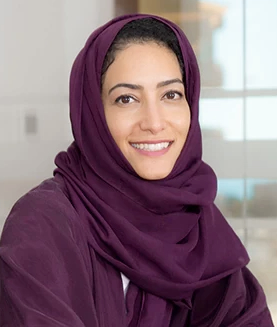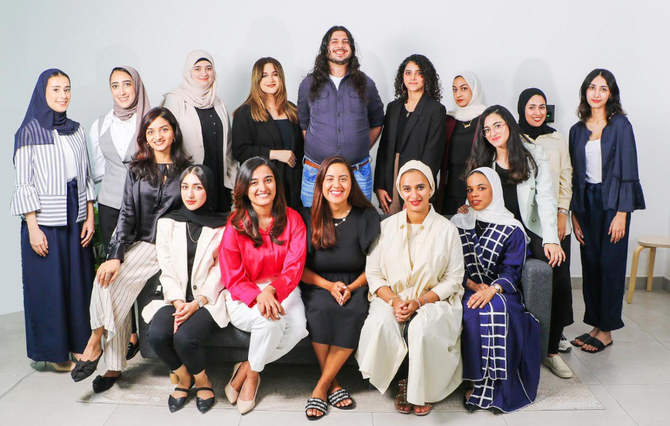JEDDAH: The aim of Vision 2030 is to create one million jobs for women in Saudi Arabia. Here are some of the women and businesses playing a leading role in creating career opportunities in the Kingdom.
Namat, a nonprofit social business by Nesma Holding Co., is aiming to integrate women living outside urban centers into the national economy, enabling them to actively contribute to the economic and social prosperity of the Kingdom by redefining the potential of ‘“Made in KSA.”
Merging lean management, continuous improvement and zero waste principles with a female-centered agenda, Namat is paving the way for socially viable, ethical and customizable garment manufacturing that benefits businesses as well as the wider community.
HIGHLIGHTS
• Namat, a nonprofit social business by Nesma Holding Co., is aiming to enrich Saudi Arabia’s garment manufacturing industry through the deployment and empowerment of women in rural areas, bringing them into the folds of the national economy.
• Playbook, a fully female- founded startup, is focused on supporting working women in the region in meeting their career aspirations.
• Debyazah, a homegrown hospitality concept, is also seeking to promote culinary science and the art of modern food display.
Noura Alturki, vice president of the Nesma Holding Co., said: “My family business, Nesma, established this project for the purpose of bringing jobs to women in the tailoring and embroidery industry. Through our social enterprise, Namat, we aim to enrich Saudi Arabia’s garment manufacturing industry through the deployment and empowerment of women in rural areas, bringing them into the folds of the national economy. This project is inspiring in its inclusiveness.”
“Our vision is to replicate tailoring centers across all of the Kingdom so that women in all 13 provinces in Saudi Arabia have access to employment. I believe an empowered woman is true to herself, silences the voices (internal and external) that doubt her in order to pave her own happiness in the world,” she said.

Noura Alturki
Namat has grown into a world-class garment manufacturing and training program employing more than 150 skilled women across four tailoring centers in the Kingdom.
Playbook, a fully female-founded startup, is focused on supporting working women in the region in meeting their career aspirations.
Several women leaders from Saudi Arabia have joined the platform as members to access their masterclass library, engage with a curated network, problem-solve, attend events, access mentorship and much more.
Members are also drawn to the impact arm of the business where each paid membership (annual fee) is matched to a free-access scholarship for women and students in underserved communities. The platform is soon to distribute thousands of scholarship access memberships through NGOs and universities in Saudi Arabia and the wider MENA region.
Based in Riyadh, Amal Dokhan, general partner at 500 Global MENA and one of a handful of female venture capitalists in Saudi Arabia and the Middle East, delivered a masterclass on the platform titled, “The Investor Mindset.”
The masterclass consisted of 11 episodes with runtimes of more than two hours. Dokhan breaks down her classes into sections that include investment terminologies, investment strategies for angels and venture capitalists, capitalization tables, dilution of shares and growth metrics.
Drawing on her personal experience as an educator, founder, angel investor and partner at a VC firm, Dokhan guides female founders toward understanding how to connect with investors and what they are looking for in a scalable startup.
Our vision is to replicate tailoring centers across all of the Kingdom so that women in all 13 provinces in Saudi Arabia have access to employment.
Noura Alturki, Vice president of the Nesma Holding Co.
Fatima Batook, brand owner, TIMA Sport Apparel and CEO of Switz Group, said that “The Investor Mindset” was her favorite masterclass. “The class opens the doorway for all struggling entrepreneurs trying to exponentially grow their businesses. It’s truly an insightful masterclass that adds a lot of value to many,” she said.
Nourah Feteih, an author, public speaker, environmental advocate and a new member of the Playbook, said: “As an environmental advocate, I always believe in spreading greatness to the world on so many levels. Playbook is doing an amazing job of supporting education for women globally to get access to the most informative and knowledgeable classes while learning from the entrepreneurs and experienced leading business women worldwide.”
“There are many scholarships that will be sent out under the member’s name. Wishing to be a philanthropist, I am glad to have received this opportunity. And, under the Saudi Vision 2030, I believe that passion, productivity and perseverance are keys to unlimited success in anything we do.”
Shreya Rammohan, Playbook co-founder and CMO, said: “Corporates such as Watar partners, Zain Group, Investcorp and other notable organizations have started onboarding their female executives to the platform. This aligns with their gender diversity and inclusion values, and their commitment to investing in relatable learning and development resources that can support their teams to network and build their personal brand. As members of the community, they can get on the app to network, seek out mentors, access learning resources, browse our masterclass library and much more.”
Rammohan said that Playbook rethinks and redefines accelerated career growth for women through curated learning resources and an engaged community.
The platform is launched on the Apple App Store and Google Play Store.
For the first time, female founders in the region are finding a bridge between tactical content on how to fundraise and access capital by learning from the masterclasses, connecting with the masters 1:1 and networking with other entrepreneurs within the community.
Lessons at Playbook grow in volume each month as the platform’s developers and founding team strategically include multiple masterclasses on decision-making, leadership, empathy, mental health, team-building, scaling, trusting your intuition, knowing your rights, maintaining a legacy in a family business, and running growth experiments.
Each of these masterclasses is led by women leaders across more than 17 industries that build their legacy and reverse-engineer their Playbook to success in the format of a masterclass. These are in Arabic and English and subtitled accordingly. It is further complemented by networking features, live event access, 1:1 mentorship and coaching opportunities, job boards and other benefits.
Nouf Masoud, CEO of Debyazah, a homegrown hospitality concept, is also seeking to promote the science of the culinary and the art of modern food display, and be Saudi Arabia’s first inclusive hospitality ambassador.
“We aim to showcase the Kingdom’s hospitality standards to the world and support the country’s vision through investing in opportunities that will nourish the local market and elevate the hospitality industry,” she said.
“We created a series of residential hospitality workshops for females in Riyadh and Jeddah to create a hospitality operation system in their own residence, making their home look and feel like a boutique hotel in addition to developing a career in the hospitality industry. At Debyazah, we aim to provide hospitality programs and short courses dedicated to individuals working in the hospitality field to develop the ultimate customer and guest experience.”
Masoud believes to achieve success as a woman entrepreneur, it is vital to surmount all odds and gain support from other companies to help the business grow.
“To create impactful momentum on a national scale, it is important to collaborate with multiple companies and organizations as they are seeking women to achieve leadership roles and are supporting them to achieve its objectives.”




































